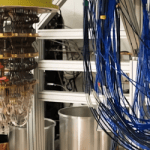Hanson of QuTech Project Discusses Effort to Build ‘The First Entanglement-Based Internet’

(OSA.org) Ronald Hanson, the director of the QuTech project at the Delft University of Technology, Netherlands, recently sketched out some of those possibilities for the quantum internet, and how his team at Delft and others are working to make this vision a reality. Hanson called the drive for a quantum internet “an amazing endeavor … but also a challenging one,” and a long-term goal that is “not going to happen in the next decade.”
Hanson is working both with European partners and in projects centered in the Netherlands to take the initial steps toward a quantum internet. In his talk, he focused on the work taking place in Delft, and on his lab’s effort to build “the first entanglement-based internet,” a four-node network that would connect centers in Delft, Leiden, The Hague, and Amsterdam.
The four-city quantum internet demonstration that Hanson and colleagues are attempting to build in the Netherlands would be a quantum memory network. The effort faces some steep and familiar challenges: creating methods for generating entanglement between nodes at a rate faster than the rate entanglement is lost; robust storage of quantum information; and the ability to bridge long distances, by converting photons to telecom wavelengths ready for fiber transmission without destroying their entanglement.



















